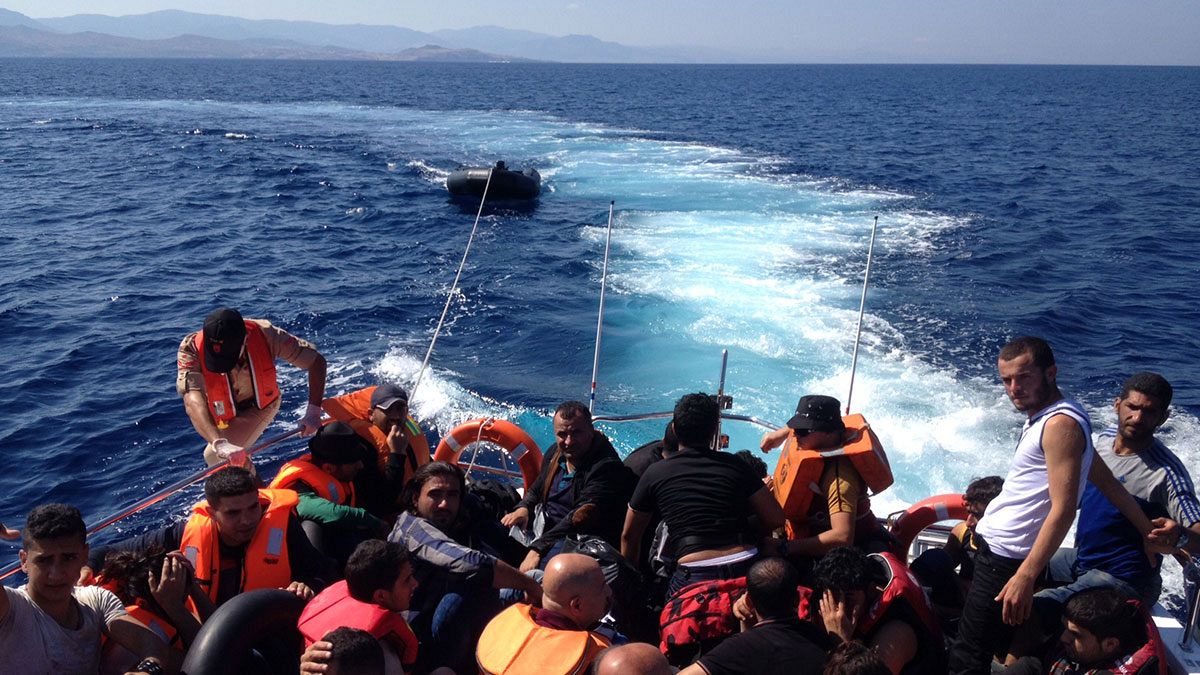Euronews’ correspondent Bora Bayraktar has visited the Turkish coast to find out why the authorities are not stopping migrants from streaming across
Euronews’ correspondent Bora Bayraktar has visited the Turkish coast to find out why the authorities are not stopping migrants from streaming across to Greece.
Exodus from Syria
Behramkale or Assos is a tiny town in modern-day Turkey on the Aegean Coast where Aristotle taught thousands years ago. The ancient city has been a magnet for tourists who liked to take photos among the columns of the ruins of the Temple of Athena at the top of the hill overlooking the Greek Island of Lesbos.
On the shore there are only 22 buildings, mostly hotels and restaurants. Visitors would take a dip in the water before enjoying sundown with a meal of fresh fish.
But the scene changed at the beginning of this summer when plastic boats carrying Syrian refugees, speeding to reach the EU started to spoil the view. Assos has now become a gateway for migrants who wish to go to Europe via Greek Islands.
Daytime journey
The most eye-opening part of the story was to see refugees travelling in broad-daylight. Having learned one of the points of departure, I drove down to hill on a dirt road to check whether I could find a spot to film refugees that night.
But by midday, surprisingly, they were already there leaving the coast in boats! Not one or two boats, but more than twelve, and simultaneously from different points.
Why can’t Turkey stop refugees?
Refugees hide in olive orchards around rocky coasts and settle there while waiting their turn to get on the boat. They are not visible from the sea, and it is challenging to reach their isolated area on foot. Locals are afraid to go to venture into the area, out of fear of the human traffickers’ guards.
Because the area has only scattered villages, the police presence is small. Local officers deal with day-to-day incidents, traffic accidents, minor thefts and the like. Although extra troops have been sent to the area, Turkey’s main security concern is from PKK guerillas in the southeast part of the country.
The security forces are concentrated in that area.
The second issue regards the rights of refugees under Turkish law. Registered refugees can freely travel within the countries and the authorities have no right to tell them where to go or where to stay. The government is planning to address the issue by changing the rules but opponents complain that the new regulations would restrict human rights.
Once migrants are at sea stopping them is difficult and risky. Refugee boats set to sail in columns, simultaneously from many points. At the same time it is possible to see 30-40 boats afloat at once They move fast, they take risks, they do not stop when they are warned.
There were originally three coast guard boats in the area, deployed to stop smuggling, deal with the pollution caused by passing ships and other routine jobs. After the migrants arrived, Turkey sent extra boats, boosting numbers to 10 in the Küçükkuyu area. Once a coast guard boat stops a migrant dinghy, it takes at least an hour to get refugees on board and return them to the port. After that the refugees are registered, delivered to the local authorities and dispatched to a refugee camp. While all this is happening, other boat loads reach Greece.
Turkish officers also are cautious about stopping the overloaded vessels because capsizing them with children, and non-swimmer aboard could be deadly. Rescuing a boatload from the water takes around half-an hour, easily enough time for many to drown.
Turkey doesn’t arrest migrants
Another problem is that refugees never give up. Even when the authorities stop and catch a refugee, after being registered, they are free to go. They will try again and again. Turkey cannot arrest them since they don’t carry passports so their identity cannot be established.
Those who do have documentation are sometimes deported. But the scale is too large to control all these people, certainly without vast investment in facilities, equipment, food and logistics authorities need money, place, food, organization to take care of. Turkey has spent five billion dollars since 2012 on the migrant crisis.
Why do they want go to Europe?
The number of refugees heading for Europe surged this summer because the price of travel dropped tenfold. Last year human traffickers charged $10,000-$12,000 per person. Now refugees say they pay $1,250 for the trip.
Another reason is that rumours and misleading news reports about the situation in Europe can spread quickly and give hope of a generous reception. And on their journey way, few have reliable access to information: they cannot charge their batteries, or connect to the internet. When I told a refugee who was trying to walk to Greece from Edirne that the borders are closed in Europe he was shocked.
From the southern border with Iraq and Syria, at the Aegean Coast and up to the Greek border Turkey’s boundaries are porous. The most widely recognised truth is that only by solving the problems of Syria so that people will prefer to stay home, can the situation ever be satisfactorily contained. Until then more people will flow and there is little the Turkish authorities at least can do about it.
Bora Bayraktar from Antep, Behramkale, Edirne and Istanbul
